
Being deeply loved by someone gives you strength, while loving someone deeply gives you courage.Lao Tzu
LoveEmbracing Tao, you become embraced. Supple, breathing gently, you become reborn. Clearing your vision, you become clear. Nurturing your beloved, you become impartial. Opening your heart, you become accepted. Accepting the World, you embrace Tao.Bearing and nurturing, Creating but not owning, Giving without demanding, Controlling without authority, This is love.Lao Tzu
We join spokes together in a wheel, but it is the center hole that makes the wagon move. We shape clay into a pot, but it is the emptiness insidethat holds whatever we want. We hammer wood for a house, but it is the inner spacethat makes it livable. We work with being, but non-being is what we use.Lao Tzu
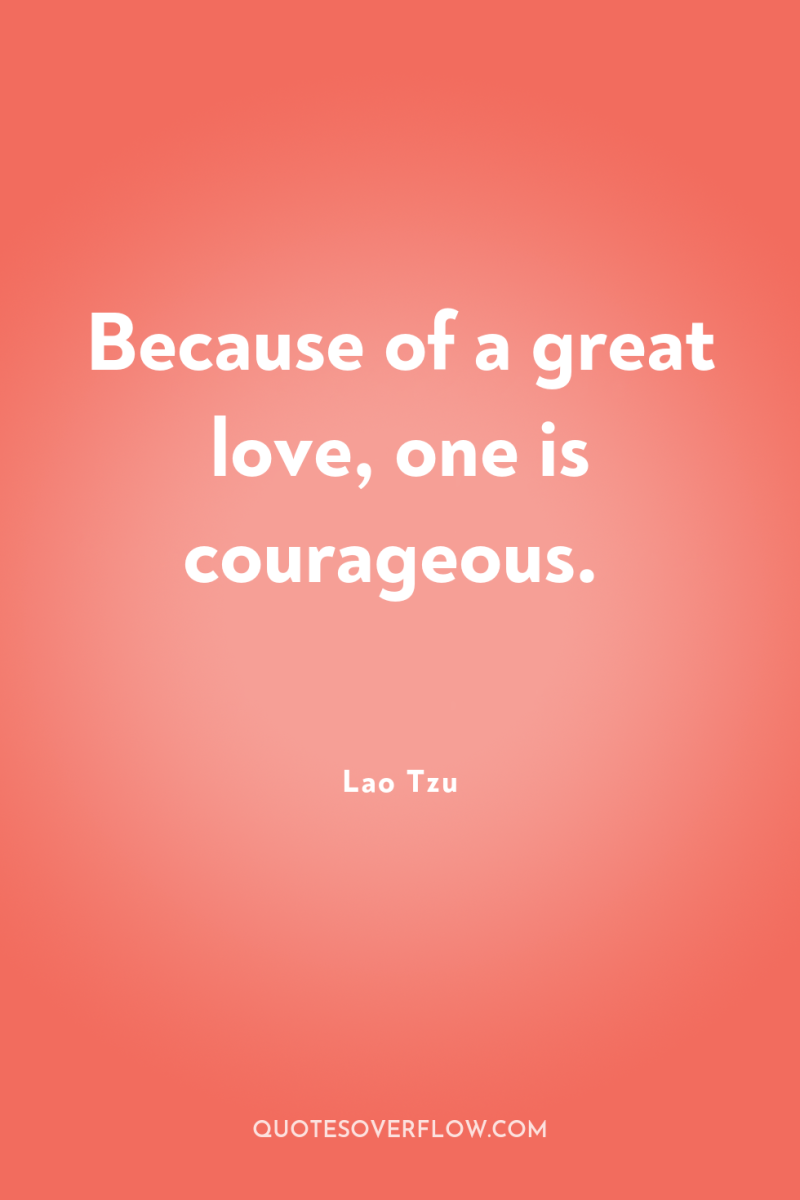
Because of a great love, one is courageous.Lao Tzu
Simplicity, patience, compassion. These three are your greatest treasures. Simple in actions and thoughts, you return to the source of being. Patient with both friends and enemies, you accord with the way things are. Compassionate toward yourself, you reconcile all beings in the world.Lao Tzu

A good traveler has no fixed plans and is not intent on arriving.Lao Tzu
If you try to change it, you will ruin it. Try to hold it, and you will lose it.Lao Tzu
In dwelling, live close to the ground. In thinking, keep to the simple. In conflict, be fair and generous. In governing, don't try to control. In work, do what you enjoy. In family life, be completely present.Lao Tzu
In the end, The treasure of life is missed by those who hold on and gained by those who let go.Lao Tzu
When I let go of what I am, I become what I might be.Lao Tzu

Your own positive future begins in this moment. All you have is right now. Every goal is possible from here.Lao Tzu
When people see some things as beautiful, other things become ugly. When people see some things as good, other things become bad.Lao Tzu

There isa time to liveand a time to diebut never to reject the moment.Lao Tzu

Do your work, then step back. The only path to serenity.Lao Tzu
There is no illusion greater than fear.Lao Tzu

The journey of a thousand miles begins with a single step. Watch your step.Lao Tzu
He who defends with love will be secure; Heaven will save him, and protect him with love.Lao Tzu

Great acts are made up of small deeds.Lao Tzu
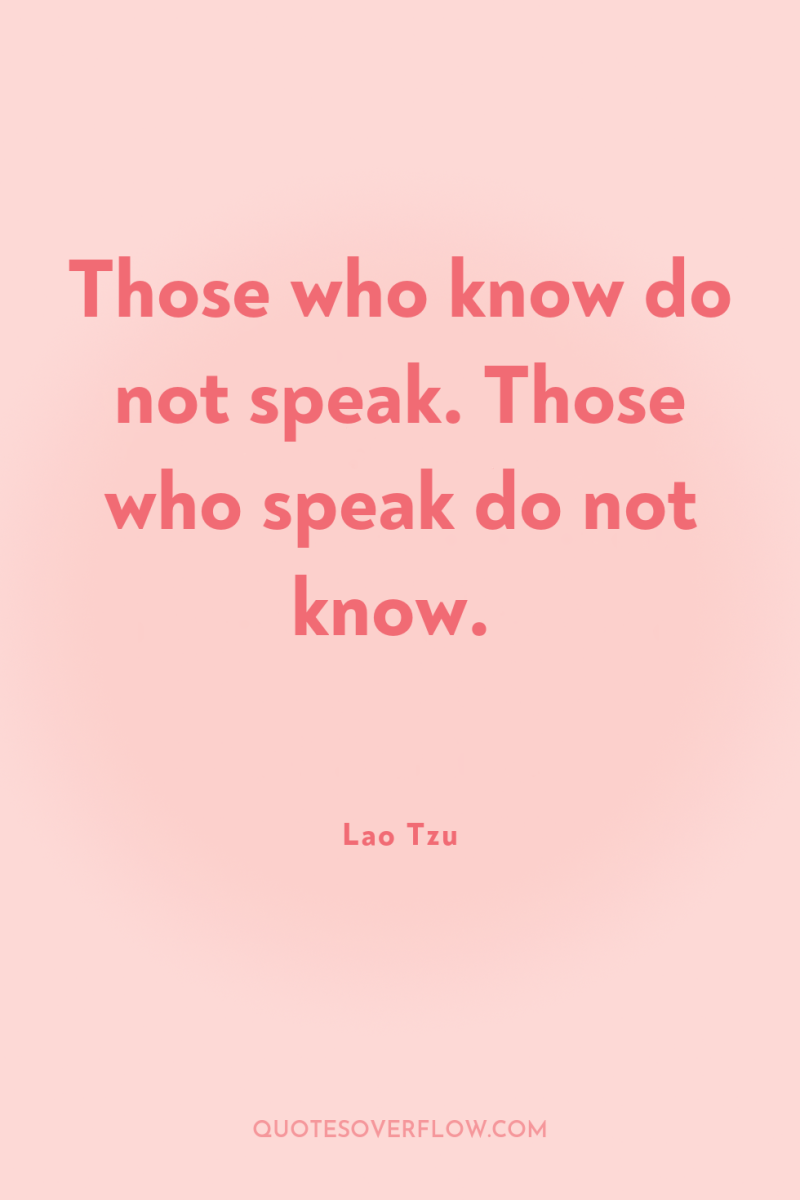
Those who know do not speak. Those who speak do not know.Lao Tzu
If you understand others you are smart. If you understand yourself you are illuminated. If you overcome others you are powerful. If you overcome yourself you have strength. If you know how to be satisfied you are rich. If you can act with vigor, you have a will. If you don't lose your objectives you can be long-lasting. If you die without loss, you are eternal.Lao Tzu
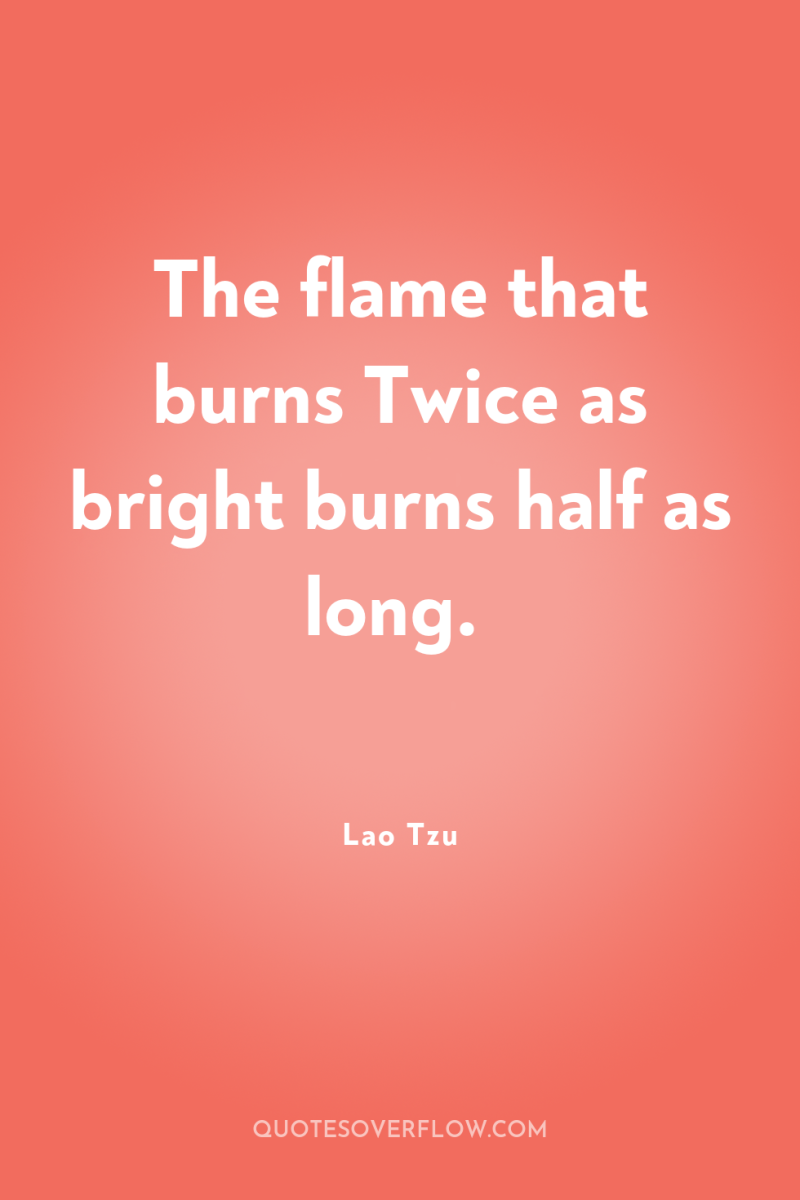
The flame that burns Twice as bright burns half as long.Lao Tzu
Doing nothing is better than being busy doing nothing.Lao Tzu
As soon as you have made a thought, laugh at it.Lao Tzu
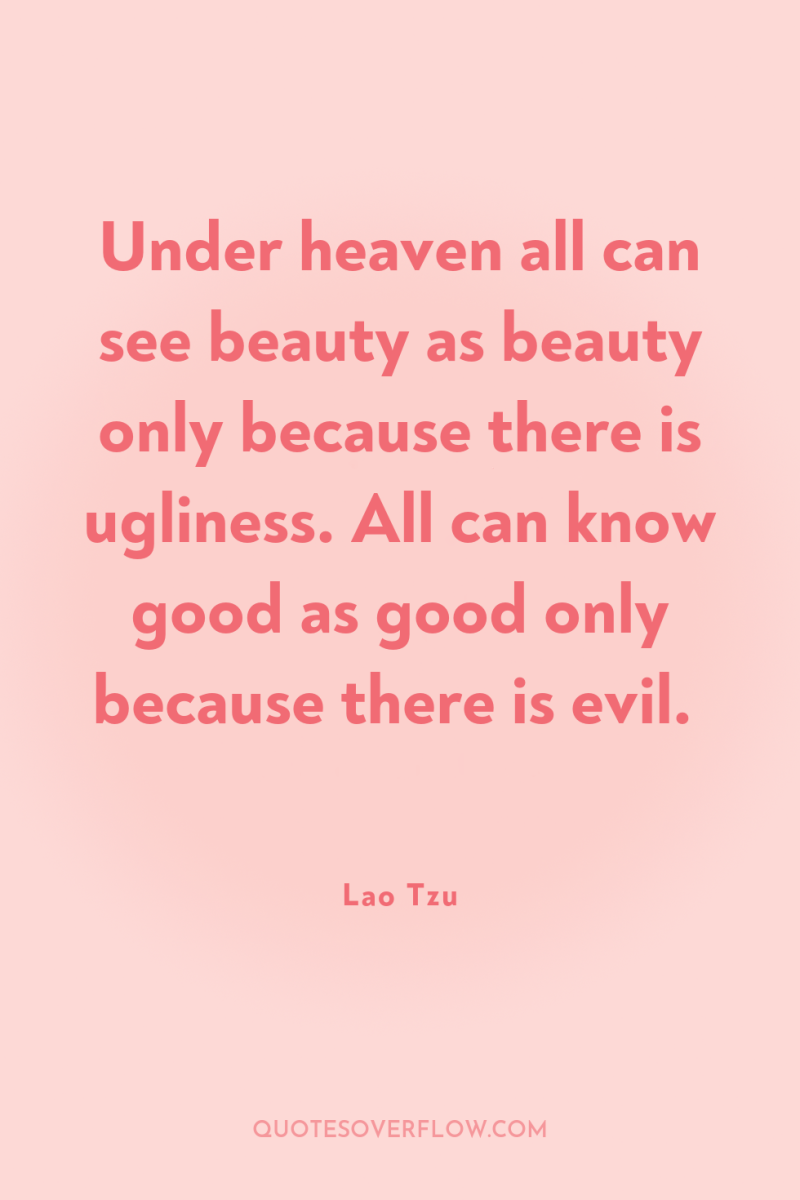
Under heaven all can see beauty as beauty only because there is ugliness. All can know good as good only because there is evil.Lao Tzu
He who is in harmony with the Taois like a newborn child. Its bones are soft, its muscles are weak, but its grip is powerful. It doesn't know about the unionof male and female, yet its penis can stand erect, so intense is its vital power. It can scream its head off all day, yet it never becomes hoarse, so complete is its harmony. The Master's power is like this. He lets all things come and goeffortlessly, without desire. He never expects results;thus he is never disappointed. He is never disappointed;thus his spirit never grows old.Lao Tzu
Existence is beyond the power of words To define: Terms may be used But are none of them absolute. In the beginning of heaven and earth there were no words, Words came out of the womb of matter; And whether a man dispassionately Sees to the core of life Or passionately Sees the surface, The core and the surface Are essentially the same, Words making them seem different Only to express appearance. If name be needed, wonder names them both: From wonder into wonder Existence opens.Lao Tzu
(So), he who displays himself does not shine; he who asserts his own views is not distinguished; he who vaunts himself does not find his merit acknowledged; he who is self-conceited has no superiority allowed to him.Lao Tzu
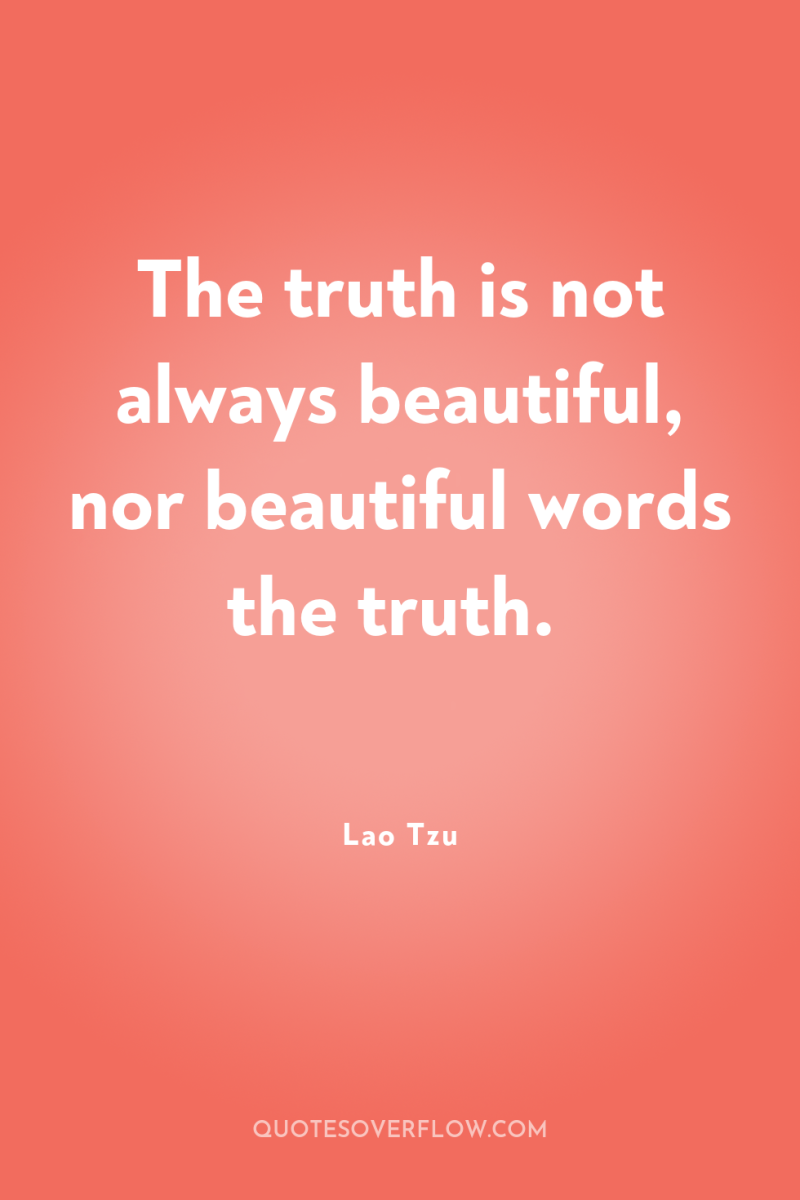
The truth is not always beautiful, nor beautiful words the truth.Lao Tzu

Klar sieht, wer von ferne sieht, nebelhaft, wer Anteil nimmt.Lao Tzu
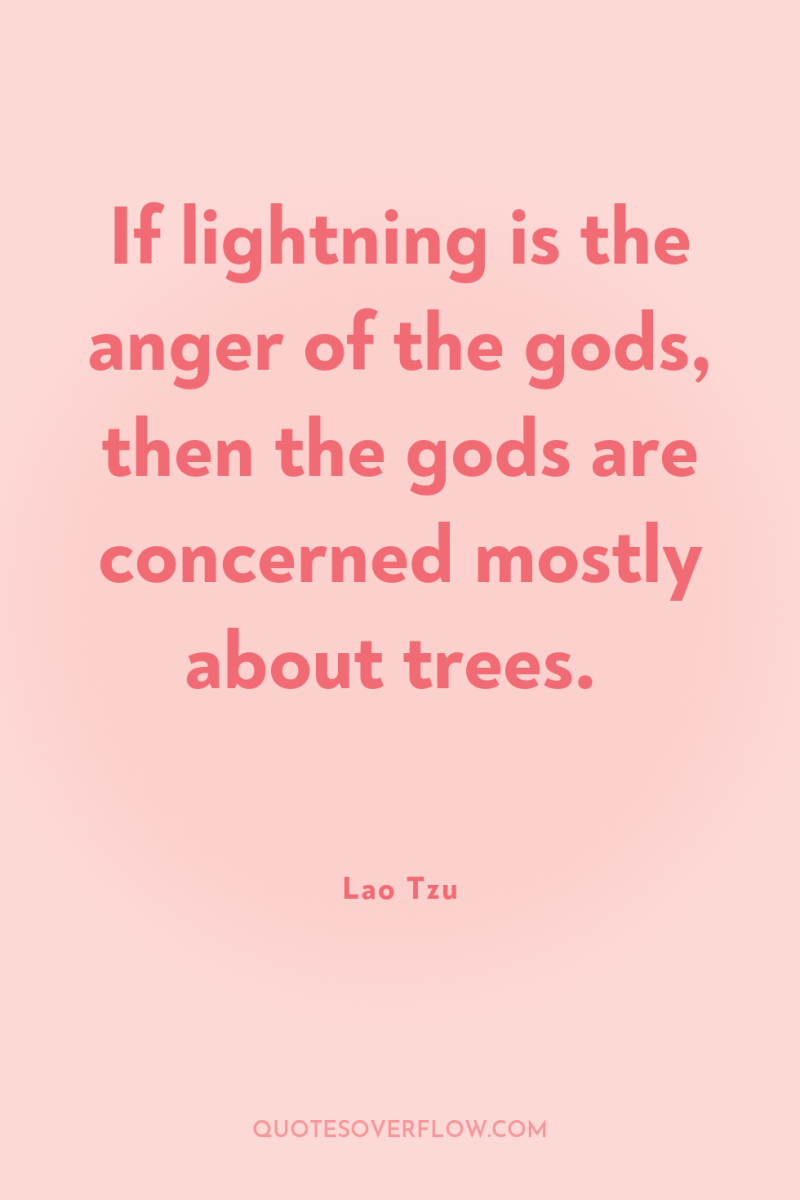
If lightning is the anger of the gods, then the gods are concerned mostly about trees.Lao Tzu

Water is the softest thing, yet it can penetrate mountains and earth. This shows clearly the principle ofsoftness overcoming hardness.Lao Tzu

He who acts, spoils; he who grasps, lets slip.Lao Tzu

He who knows, does not speak. He who speaks, does not know.Lao Tzu

A good traveler leaves no tracks. Good speech lacks fault-finding.Lao Tzu

The heart that gives, gathers.Lao Tzu
The past has no power to stop youfrom being present now. Only your grievance aboutthe past can do that. What is grievance? The baggage of oldthought and emotion.Lao Tzu

The power of intuitive understanding will protect you from harm until the end of your days.Lao Tzu
A man who knows how little he knows is well, a man who knows how much he knows is sick. If, when you see the symptoms, you can tell, Your cure is quick. A sound man knows that sickness makes him sick and before he catches it his cure is quick.Lao Tzu
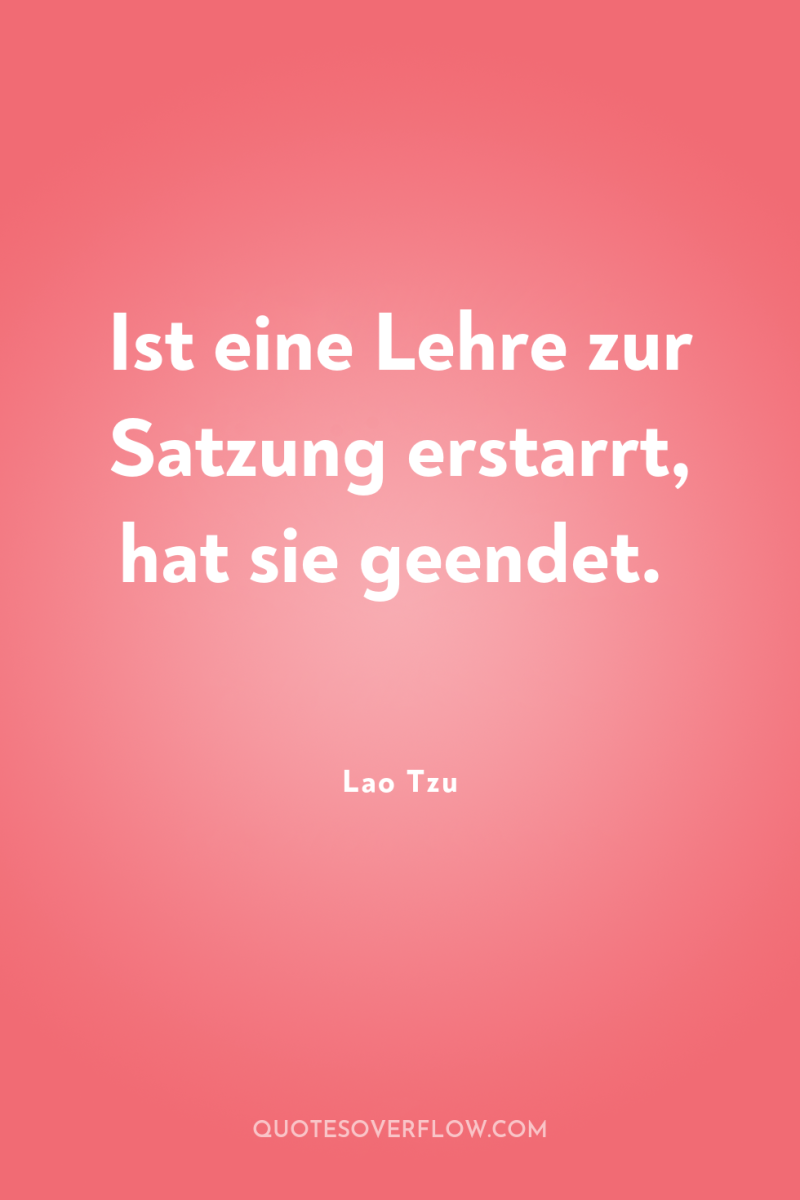
Ist eine Lehre zur Satzung erstarrt, hat sie geendet.Lao Tzu

I do not concern myself with gods and spirits either good or evil nor do I serve any.Lao Tzu

To know that you do not know is the best. To think you know when you do not is a disease. Recognizing this disease as a disease is to be free of it.Lao Tzu

Knowledge is a treasure, but practice is the key to it.Lao Tzu

In pursuit of knowledge, every day something is acquired. In pursuit of wisdom, every day something is dropped.Lao Tzu

Time is a created thing. To say 'I don't have time, ' is like saying, 'I don't want to.Lao Tzu
The Tao that can be told is not the eternal Tao. The name that can be named is not the eternal name. The nameless is the beginning of heaven and earth. The named is the mother of ten thousand things. Ever desireless, one can see the mystery. Ever desiring, one can see the manifestations. These two spring from the same source but differ in name; this appears as darkness. Darkness within darkness. The gate to all mystery.Lao Tzu
...the mind is just as immeasurable as the vast universe. An integral being settles his mind just as the vast universe settles itself. He unites his mind with the unnameable Subtle Origin of the multi-universe in which there is no past, present or future. This is how an integral being deals with his mind.Lao Tzu
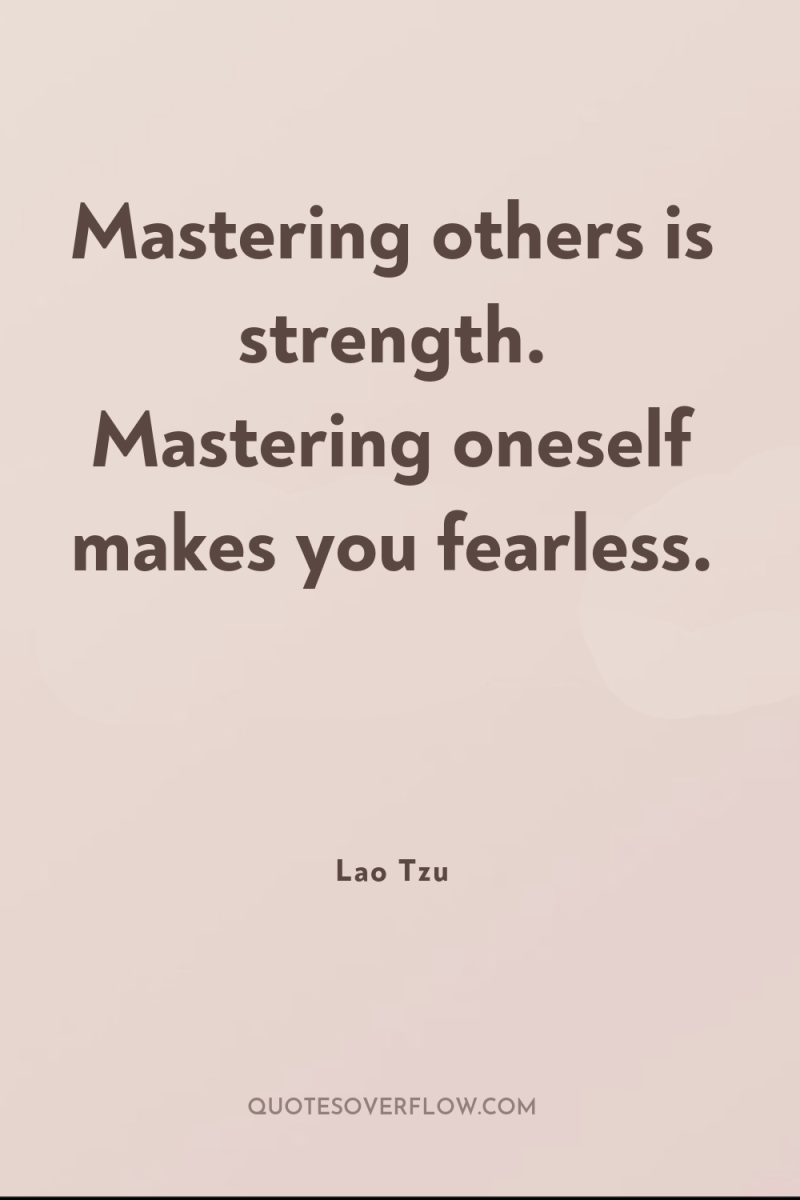
Mastering others is strength. Mastering oneself makes you fearless.Lao Tzu

A leader is best When people barely know he exists Of a good leader, who talks little, When his work is done, his aim fulfilled, They will say, “We did this ourselves.Lao Tzu

If you want to govern the people, You must place yourself below them. If you want to lead people, You must learn how to follow them.Lao Tzu
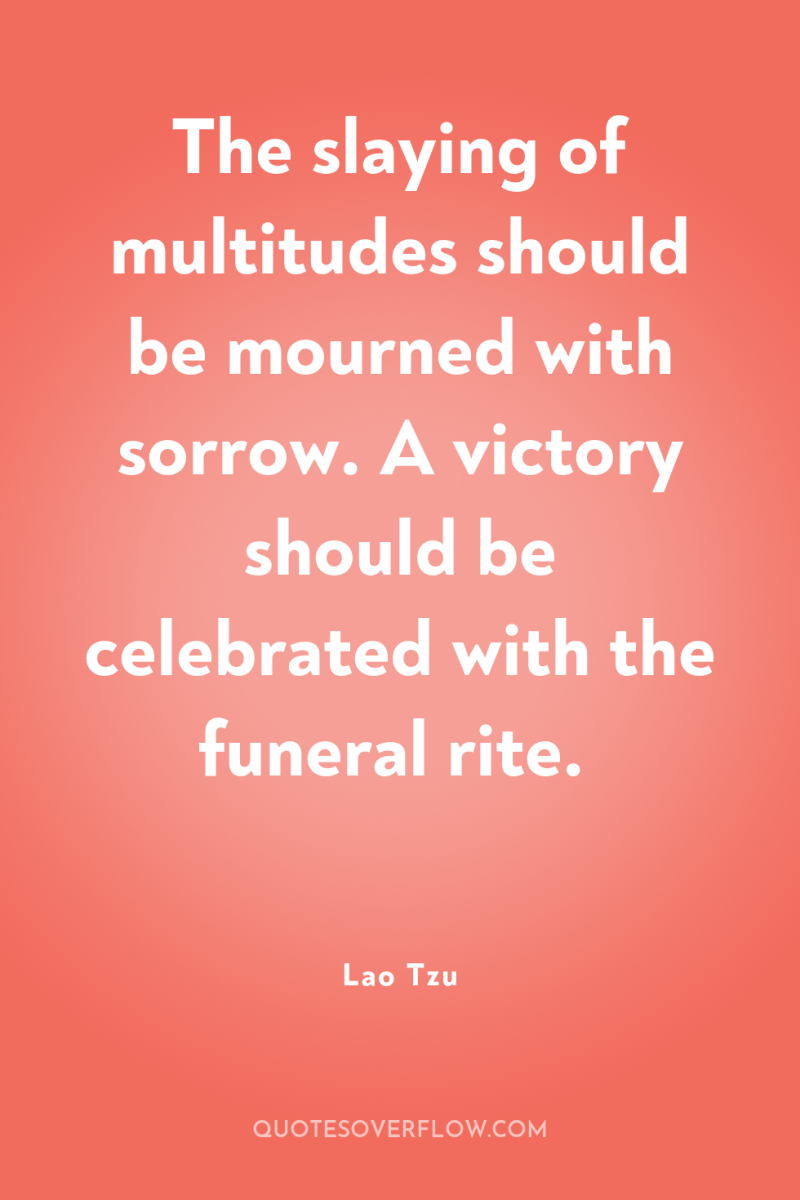
The slaying of multitudes should be mourned with sorrow. A victory should be celebrated with the funeral rite.Lao Tzu
Be careful what you water your dreams with. Water them with worry and fear and you will produce weeds that choke the life from your dream. Water them with optimism and solutions and you will cultivate success. Always be on the lookout for ways to turn a problem into an opportunity for success. Always be on the lookout for ways to nurture your dream.Lao Tzu

Thirty spokes Share one hub. Make the nothing therein appropriate, and you will have the use of the cart.Lao Tzu
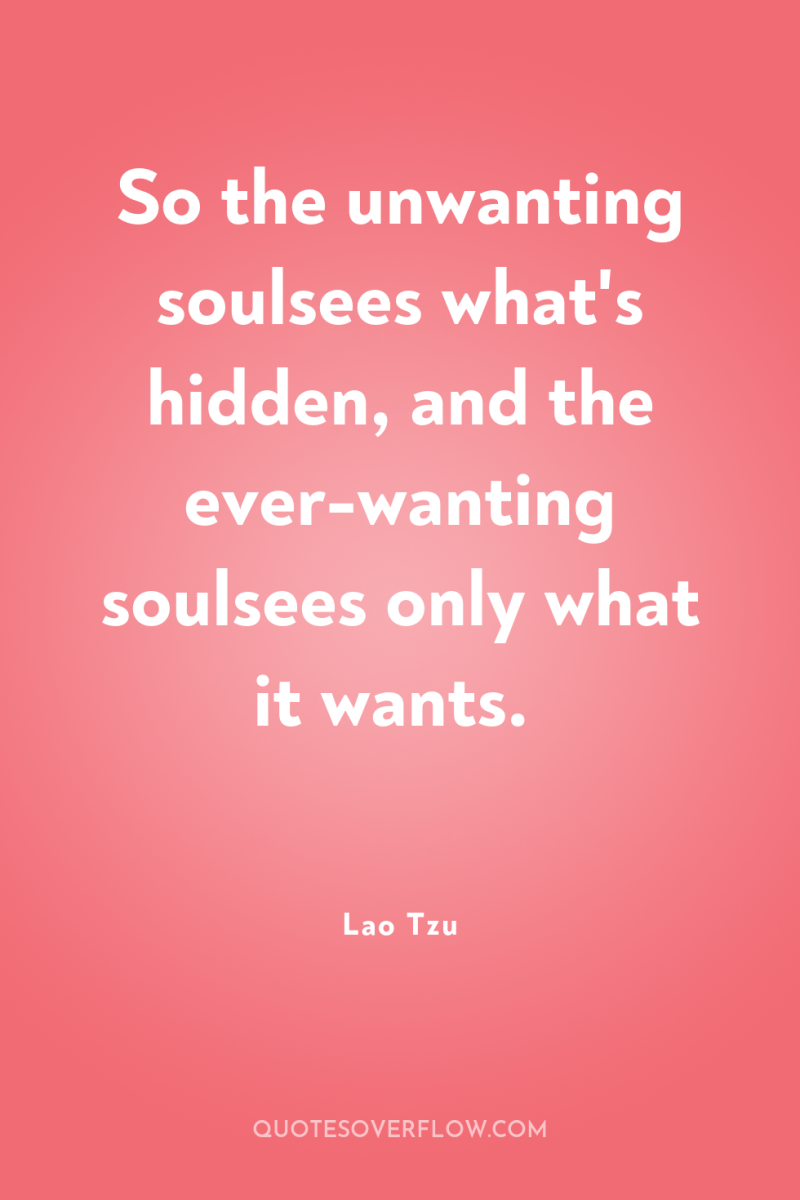
So the unwanting soulsees what's hidden, and the ever-wanting soulsees only what it wants.Lao Tzu
I have three precious things which I hold fast and prize. The first is gentleness; the second is frugality; the third is humility, which keeps me from putting myself before others. Be gentle and you can be bold; be frugal and you can be liberal; avoid putting yourself before others and you can become a leader among men.Lao Tzu
Go to the people. Live with them. Learn from them. Love them. Startwith what they know. Build with what they have. But with the bestleaders, when the work is done, the task accomplished, the people willsay 'We have done this ourselves.Lao Tzu
The ruler attains wholeness in the correct governance of the people.Lao Tzu
To lead people, you must follow behind.Lao Tzu
Music in the soul can be heard by the universe.Lao Tzu
Love is of all the passions the strongest, for it attacks simultaneously the head, the heart, and the senses.Lao Tzu
Do you imagine the universe is agitated? Go into the desert at night and look at the stars. This practice should answer the question.Lao Tzu
Watch your thoughts, they become your words; watch your words, they become your actions; watch your actions, they become your habits; watch your habits, they become your character; watch your character, it becomes your destiny.Lao Tzu
If you don’t stand sincere by your wordshow sincere can the people be? Take great care over words, treasure them.1.17Lao Tzu
The Master doesn't try to be powerful;thus he is truly powerful. The ordinary man keeps reaching for power;thus he never has enough. The Master does nothing, yet he leaves nothing undone. The ordinary man is always ding things, yet many more are left to be done.[…] Therefore the Master concerns himself With the depths and not the surface, With the fruit and not the flower.[…] Teaching without words, Performing without actions: That is the Master’s way.[…] The Master arrives without leaving, Sees the light without looking, Achieves without doing a thing.[…] The Master is above the people, And no one feels oppressed. She goes ahead of the people, And no feels manipulated. The whole world is grateful to her. Because she completes with no one, No one can complete with her. .Lao Tzu
The Way to do is to be.Lao Tzu
When there is silence one finds the anchor of the universe within oneselfLao Tzu
Thus it is said: The path into the light seems dark, the path forward seems to go back, the direct path seems long, true power seems weak, true purity seems tarnished, true steadfastness seems changeable, true clarity seems obscure, the greatest are seems unsophisticated, the greatest love seems indifferent, the greatest wisdom seems childish. The Tao is nowhere to be found. Yet it nourishes and completes all things.Lao Tzu
If you are untrustworthy, people will not trust you.Lao Tzu
One gains by losing and loses by gaining.Lao Tzu
If a person seems wicked, do not cast him away. Awaken him with your words, elevate him with your deeds, repay his injury with your kindness. Do not cast him away; cast away his wickedness.Lao Tzu
Revere the unity of all-that-iscarry out your daily activities with compassion;if you do not limit your compassion, you yourself will not be limited.Lao Tzu
Heaven’s Tao is impartial, yet those who follow its compassionate waywill always be nourishedLao Tzu
Attain complete emptiness, Hold fast to stillness. Understanding the ordinary: Mind opens. Mind opening leads to compassion, Compassion to nobility, Nobility to heavenliness, Heavenliness to TAO. TAO endures. Your body dies. There is no danger.Lao Tzu
Simplicity, patience, compassion. These three are your greatest treasures. Simple in actions and thoughts, you return to the source of being. Patient with both friends and enemies, you accord with the way things are. Compassionate toward yourself, you reconcile all beings in the world."…" There is no greater misfortunethan underestimating your enemy. Underestimating your enemymeans thinking that he is evil. Thus you destroy your three treasuresand become an enemy yourself. When two great forces oppose each other, the victory will goto the one that knows how to yield.Lao Tzu
Kindness in words creates confidence. Kindness in thinking creates profoundness. Kindness in giving creates love.Lao Tzu
The wise man does not lay up his own treasures. The more he gives to others, the more he has for his own.Lao Tzu
With those who are kindthe sage is kind With those who are not kindthe sage is also kindbecause the way of Tao is kindnessLao Tzu
The journey of a thousand miles begins with a single step.Lao Tzu
Highly evolved people have their own conscience as pure law.Lao Tzu
Any good person who is motivated to attain awareness of the whole truth should follow the Universal Way to calm his mind and harmonize it with all aspects of life.Lao Tzu
Health is the greatest possession. Contentment is the greatest treasure. Confidence is the greatest friend.Lao Tzu
Failure is an opportunity. If you blame someone else, there is no end to the blame. Therefore the Masterfulfills her own obligationsand corrects her own mistakes. She does what she needs to doand demands nothing of others.Lao Tzu
Rushing into action, you fail. Trying to grasp things, you lose them. Forcing a project to completion, you ruin what was almost ripe. Therefore the Master takes actionby letting things take their course. He remains as calm at the end as at the beginning. He has nothing, thus has nothing to lose. What he desires is non-desire;what he learns is to unlearn. He simply reminds peopleof who they have always been. He cares about nothing but the Tao.Thus he can care for all things.Lao Tzu
Free from desire, you realize the mysterycaught in the desire, you see only the manifestations.Lao Tzu
The best fighter is never angry.Lao Tzu
Stop thinking, and end your problems.Lao Tzu
Silence is a source of Great Strength.Lao Tzu
The more laws and restrictions there are, The poorer people become.... The more rules and regulations, The more thieves and robbers.Lao Tzu
Lao Tzu "The key to growth is the introductionof higher dimensions of consciousnessinto our awareness.Lao Tzu
As to the roaming of sages, They move in utter emptiness, Let their minds meander in the great nothingness; They run beyond convention And go through where there is no gateway. They listen to the soundless And look at the formless, They are not constrained by society And not bound to its customs.- Lao-tzuLao Tzu
The Master, by residing in the Tao, sets an example for all beings. Because he doesn't display himself, people can see his light. Because he has nothing to prove, people can trust hisLao Tzu
Heaven's net is wide, but its mesh is fineLao Tzu
No one can insult me, because I do not want respect. No one can defeat me, because I have given up the idea of winning. How can you defeat me? You can only defeat someone who wants to win.Lao Tzu
To speak little is natural. Therefore a gale does not blow a whole morning nor does a downpour last a whole day.Lao Tzu
Because one believes in oneself, one doesn't try to convince others. Because one is content with oneself, one doesn't need others' approval. Because one accepts oneself, the whole world accepts him or her.Lao Tzu
Allow the heart to empty itself of all turmoil! Retrieve the utter tranquility of the mind from which you issued. Although all forms are dynamic, and we all grow and transform, each of us is compelled to return to our root. Our root is quietude.Lao Tzu
Trying to understand is like straining through muddy water. Have the patience to wait! Be still and allow the mud to settle.Lao Tzu
Choose food, clothing, and shelter that accords with nature. Rely on your own body for transportation. Allow your work and your recreation to be one and the same. Do exercise that develops your whole being and not just your body. Listen to music that bridges the three spheres of your being. Choose leaders for their virtue rather than their wealth or power. Serve others and cultivate yourself simultaneously. Understand that true growth comes from meeting and solving problems of life in a way that is harmonizing to yourself and to others. If you can follow these simple old ways, you will be continually renewed.Lao Tzu
Knowing others is Wisdom, knowing yourself is EnlightenmentLao Tzu
If the people never fear death, what is the purpose of threatening to kill them? If the people ever fear death, and I were to capture and kill those who are devious, who would dare to be so? If the people must be ever fearful of death, then there will always be an executioner. Now, To kill in place of the executioner Is like Hewing wood in place of the master carpenter; Few indeed will escape cutting their own hands! .Lao Tzu
Following the Universal Way means practicing selflessness and extending virtue to the world unconditionally. In this way one not only eliminates the heavy contamination accumulated throughout many lifetimes but may also bring about the possibility of restoring one's original divine nature and become an integral being of the multi-universe.Lao Tzu